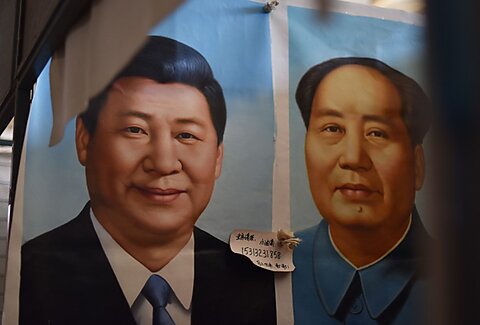Clark Packard
Since the late 1970s, when Chinese president Deng Xiaoping initiated some market‐oriented liberalization, the country has been on an upward economic trajectory. As documented by my colleague Jim Dorn in a recent essay for Cato’s Defending Globalization project, these reforms yielded substantial dividends. It is estimated that nearly 800 million Chinese were lifted out of extreme poverty since 1980, coinciding with the onset of these reforms.
In recent years, particularly under the leadership of Xi Jinping, China has pivoted away from the market‐oriented policies that catapulted it to prosperity and global influence.
Today, the prevailing consensus within Washington policy circles is that China is an economic juggernaut poised to surpass the United States as the world’s leading economy in the near future. Proponents contend that Beijing’s reembrace of heavy industrial policy, coupled with the abandonment of market liberalization, has energized the Chinese economy.
However, the actual reality departs from the proponents’ simplistic narrative, as I argue in my new essay for Cato’s Defending Globalization project.
Indeed, China confronts an array of short‐ and long‐term economic challenges.
Short‐Term Headwinds
Today China grapples with several immediate challenges that are almost certain to exert downward pressure on its economy in the coming years. Xi Jinping has rapidly moved the country in an illiberal direction. The once‐dynamic and thriving tech sector has been stymied by Xi Jinping’s embrace of Maoist socialism. China has cracked down on educational platforms, and its general aversion to private sector enterprises continues to exacerbate youth unemployment, which is estimated to have exceeded 20 percent.
China’s real estate sector is overinflated, and property developers are failing to deliver promised residential units, leading to a widespread middle‐class boycott of mortgage payments in 2022. Major Chinese property developer Evergrande defaulted on its debt in late 2021 and then filed for bankruptcy in August.
Earlier this week, the largest Chinese property developer, Country Garden, warned that “it doesn’t expect to be able to repay all of its U.S. dollar bonds and other offshore debts,” according to the Wall Street Journal. This is a worrying sign about Beijing’s ability to stabilize the country’s beleaguered housing market. Meanwhile, local governments, reliant on land sales to fund public services, are increasingly grappling with constrained budgets.
China’s handling of the COVID-19 pandemic has been fraught with difficulties, and the nation’s increasing dependence on forced labor and repression in the Xinjiang region has drawn international condemnation. Additionally, Beijing has reneged on its “One Country, Two Systems” commitment to Hong Kong, effectively annexing it in 2020 with the passage of the national security law. Today Beijing’s galloping illiberalism has rendered the country less attractive for foreign investment.
Long‐Term Headwinds
While the short‐term challenges may be surmountable with different policies, the long‐term headwinds pose more formidable and enduring obstacles.
First, China is facing a rapidly aging population and a diminishing workforce, which will dampen economic output, stifle innovation, and strain government services. The United Nations recently projected that India will overtake China as the world’s most populous country in 2023. Notably, China’s aging population is an accelerating phenomenon, as highlighted by a Foreign Affairs article that observed, “In 1978, the average median age of a Chinese citizen was 21.5 years. By 2021, it had risen to 38.4, surpassing the United States.” China’s fertility rate has plummeted to 1.15 births per woman, well below the replacement rate of 2.1 births per woman.
Furthermore, China is witnessing an exodus of talent as young, highly educated individuals seek opportunities abroad. Take artificial intelligence (AI), where a significant proportion of top‐tier AI researchers globally obtained their undergraduate degrees in China. However, the majority do not remain in China, with 56 percent choosing the United States as their preferred destination.
Reasons for this exodus, as explained by a report from the Paulson Institute at the University of Chicago, include the “relatively relaxed and innovative scientific research environment” in the United States compared to China, China’s “authoritarian political system and restricted freedom,” and various impediments such as “language barriers, pervasive internet censorship, and environmental quality.”
Additionally, China’s workforce productivity is not expanding at the same robust pace as it has in the past. The period following Deng’s reforms witnessed a rapid surge in productivity growth, largely attributable to catch‐up growth due to China’s low starting point. Today, mounting evidence suggests that productivity growth is slowing, or perhaps even reversing, representing a more pronounced decline compared to global productivity trends.
Demographic shifts and brain drain certainly play a role in this phenomenon, but China’s growing reliance on top‐down central planning and industrial policy also contribute. According to a 2022 paper from the International Monetary Fund, state‐owned enterprises (SOEs) are estimated to be 20 percent less productive than their private sector counterparts in the same industry. This contrasts with the period of reform between 1998 and 2005, which fostered significant private sector entrepreneurship, as detailed in a recent blog post.
Collectively, the economic reforms that China undertook from the late 1970s to 2012 propelled the nation to increasing wealth and improved living standards for the average citizen. In recent years, however, the country has veered toward illiberalism, characterized by heavy‐handed state intervention and repressive human rights practices. These policies are beginning to manifest in economic data; for instance, foreign direct investment (FDI) in China has dwindled from around 4 percent of China’s GDP in 2011 to approximately 1 percent today. As economist Noah Smith has noted, FDI from G7 countries declined from $35.4 billion in 2014 to $16.3 billion in 2020.
For policymakers in Beijing seeking to rejuvenate the economy, a return to the market‐oriented reforms of the past is the key to future growth.

